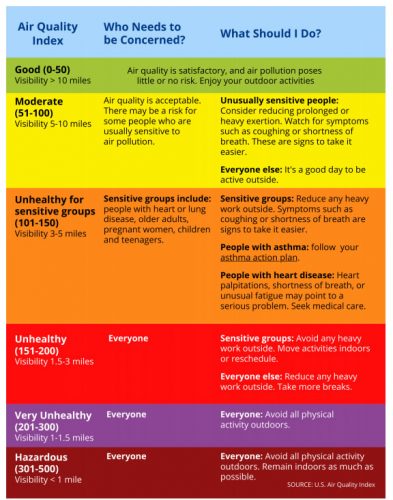San Andreas, CA — An Air Quality Advisory has been issued to alert the public of the potential for poor air quality conditions primarily due to smoke from the Dixie Fire in Plumas County and the Caldor Fire in El Dorado County.
The joint notification by the Calaveras County Health Officer and Calaveras County Air Pollution Control District shall remain in effect until Friday (August 20) at 1 p.m. and could be extended depending on conditions. Smoke concentrations may be severe in some locations depending upon wind direction, until the fires are extinguished, advise county health officials. They add, “In the evenings, smoke tends to move downhill, becoming more concentrated in lower elevation areas including the foothills and the lower river drainage basins. In the afternoon and early evening hours, conditions may improve as smoke rises.”
Wildfire smoke can irritate your lungs, cause inflammation, affect your immune system, and make you more prone to lung infections as it contains very tiny particles that can be inhaled deep into the lungs. Symptoms may include, but are not limited to, coughing, watery and itchy eyes, headache, scratchy throat, and difficulty in breathing.
County health officials provided this list of individuals at greater risk of harmful health effects from wildfire smoke:
- Children under 18 years of age
- Adults aged 65 and older
- Pregnant women
- People with chronic health conditions such as heart or lung disease, asthma, and diabetes
- People who work outdoors
- People who are immunocompromised or taking drugs that suppress the immune system
- People who currently have or who are recovering from COVID-19
The best protection is to reduce exposure is by taking these precautions recommended by health officials:
- Stay indoors with the windows and doors closed, if possible
- Use a portable air cleaner in one or more rooms. Portable air cleaners work best when run continuously with doors and windows closed.
- Whenever you can, use air conditioners, fans, and window shades to keep your cleaner air space comfortably cool on hot days.
- Run your air-conditioner only if it does not bring smoke in from the outdoors. Change the standard air conditioner filter to a medium or high-efficiency filter. If available, use the recirculate or recycle setting on the unit
- Limit outdoor exertion and physical activity
- Avoid activities that create more indoor and outdoor air pollution, such as smoking, frying foods, sweeping, and vacuuming.
- Reduce unnecessary driving. If traveling through smoke-impacted areas, be sure that your vehicle’s ventilation system is on recirculate
- Get a COVID-19 vaccine as soon as you can. COVID-19 vaccines help protect you from getting sick or severely ill with COVID-19 and may also protect people around you, especially when physical distancing is difficult.
Regarding using cloth masks to protect against the smoke, like those that are used to slow the spread of COVID-19 by blocking respiratory droplets, Health officials advise, “They offer little protection against wildfire smoke. They might not catch small, harmful particles in smoke that can harm your health. N95 and KN95 respirators can provide protection from wildfire smoke.”

The public is advised to monitor the air quality as it can change rapidly at different times during the day due to wind shifts. County health officials offer this chart to be used as a guideline for outdoor activities. Visual distance can also be an indicator of how concentrated the smoke is in your location, relay health officials. Information on air quality and smoke can be found on mymotherlode.com by clicking here, then scroll down to the radar map and click on the tab EPA.
Additional advisories will be updated as air quality conditions evolve. For more information, call the Calaveras County Air Pollution Control District at (209) 754-6601 or Calaveras County Public Health Division at (209) 754-6460.

